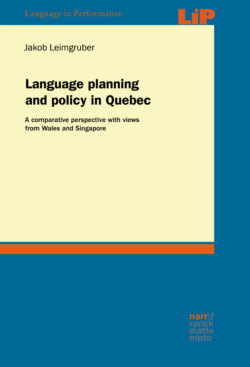Читать книгу Language planning and policy in Quebec - Jakob Leimgruber - Страница 8
На сайте Литреса книга снята с продажи.
1 Introduction
ОглавлениеMuch has been written about language planning and language policies (LPP) in Quebec. Less work has been done, on the other hand, to situate this planning and these policies within larger issues governing LPP globally. The special situation of Quebec, a predominantly French-speaking province within a predominantly English-speaking country and continent, deserves attention in its own right: the Francophone population, numbering around 7.1 million in Canada, is largely concentrated in the province of Quebec (6.1 million),1 and has long been eager to protect its language from assimilation into English. The acute awareness of being surrounded by the English language, and being in a disadvantaged position both in terms of population size and the economic opportunities resulting from this minority status, has led to the formulation, in the 1960s and 1970s, of a series of legal proposals aimed at securing the survival of the language at least within the borders of the province, culminating in the 1977 Charter of the French language.
The relationship between language, nation, and state are critical to the understanding of the LPP existing in Quebec. The Québécois are recognised as a ‘nation within a united Canada’ by federal legislation, a wording that does little to address the ambiguous relationship between the nation and its ethnic and linguistic components (see section 2.3 for a discussion of ethnic and civic nationhood in Quebec). Contemporary policy would seem, however, to consider the French language as the prerequisite for membership in the Quebec nation. The provincial state, by extension, upholds the language rights of that nation and implements the legal framework necessary to safeguard its continued existence.
Quebec, rooted as it may be within its French linguistic tradition, remains an important part of the Canadian historical, cultural, and economic fabric. As such, particularly as regards its connectedness with the Canadian, continental, and global market economy, it is exposed to the same globalising forces of the ‘post-national’ (Heller, 2010; Heller, 2011; Heller et al., 2015; Wright, 2016) era as any other economically connected place on the planet. The way in which LPP takes into account the transnational flows of people, languages, and cultural capital is of paramount interest: its development from a policy bound by territorial concerns of the ethnolinguistic nation-state to one taking into account these globalised phenomena is something that this book will attempt to shed light on. The way in which similar challenges, among them the predominance of the English language as the global lingua franca, have been met in other polities, specifically in Wales and in Singapore, will inform our understanding of the situation in Quebec.
